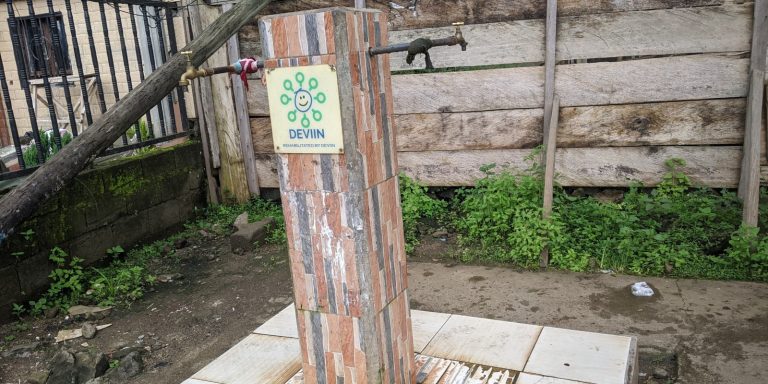
A Lifeline in Crisis: Rehabbing Waterpoints in Buea, Cameroon
In regions ravaged by conflict, access to clean and safe water is a crucial but often neglected. The Transition to Scale project, “Enhancing Health and Wellbeing through Improved Community Water Supply Systems,” aims to address this pressing issue by rehabilitating damaged waterpoints. The piloting phase of this project has yielded compelling evidence of how such innovations can significantly improve health outcomes and enhance community resilience in conflict-affected contexts. The socio-political conflict affecting the Northwest and South west regions of Cameroon has had a devastating impact on countless communities, disrupting essential services and leaving many vulnerable to disease and hardship. Access to clean water is a fundamental human right, and its absence can have severe consequences for health and well-being. To address this pressing issue, our project, “Enhancing Health and Wellbeing through Improved Community Water Supply Systems,” has undertaken the rehabilitation of waterpoints in Buea, a region heavily affected by the conflict.
Evidence from our Pilot Rehabilitation of the Bonduma Waterpoint
The Challenge
In conflict zones, infrastructure such as waterpoints often deteriorates due to damage and neglect. This results in unsafe drinking water, which exacerbates health problems and hinders recovery efforts. Our project focused on revitalizing these critical water sources to restore reliable access to clean water.
The Importance of Waterpoint Rehabilitation
Waterpoints are vital infrastructure that provide communities with access to clean water for drinking, cooking, sanitation, and agriculture. When these waterpoints fall into disrepair, they can lead to a range of health problems, including waterborne diseases, malnutrition, and increased vulnerability to disease outbreaks. By rehabilitating existing waterpoints, we can significantly improve the lives of people in conflict affected communities. This involves repairing damaged infrastructure, replacing faulty equipment, and ensuring that water sources are safe and accessible to all.
Pilot Implementation and Results
The pilot phase was implemented in Bonduma community, Buea, South west region of Cameroon, selected for its severe water infrastructure challenges. Our approach involved repairing damaged pumps, restoring water quality, renovating the structure, cleaning it’s surroundings, and building local capacity for ongoing maintenance.
The pilot face of our project rehabilitating the tap in Bonduma focused on identifying and rehabilitating the waterpoint as there was a need of urgent attention. This involved:
• Needs Assessment: Conducting a thorough assessment of the condition of the existing waterpoint.
• Resource Mobilization: Securing funding and resources to support the rehabilitation efforts., which Deviin, Funded.
• Infrastructure Repair: Implementing necessary repairs, by replacing and fixing pumps, renovating the structure of the waterpoint and cleaning its surroundings.
• Community Engagement: Deviin Involved the local community in the planning and implementation of the project to ensuring community ownership and sustainability.
Impact and Outcomes
The rehabilitation of the Bunduma waterpoint in Buea has had a profound impact on the lives of residents in the areas. Some of the key benefits include:
1. Reduced Incidence of Waterborne Diseases: Access to clean water has led to a significant reduction in the prevalence of waterborne diseases, such as diarrhea and cholera, among the population.
2, Improved Health Outcomes: Improved access to clean water has positively impacted overall health, particularly for children and pregnant women, who are most vulnerable to water-related illnesses.
3. Enhanced Livelihoods: Access to clean water has enabled the community to engage in activities that have improved their livelihoods.
4. Strengthened Community Resilience: By addressing this critical need for clean water, the project has helped to strengthen community resilience and build a more sustainable future.
Sustainability and Local Impact
The pilot also focused on empowering the local community through a training program for waterpoint maintenance and management. These efforts have successfully built local expertise, ensuring the sustainability of the waterpoint. The Community management committee have played a key role in overseeing and maintaining the water point, further strengthening local governance and resilience.
Conclusion
The rehabilitation of waterpoints is a vital component of humanitarian response efforts in conflict-affected areas. By investing in this critical infrastructure, improving access to clean water, the project has not only enhanced public health but also fostered community development and resilience. we can save lives, improve health outcomes, and support the recovery of communities. Our pilot project in Buea demonstrated the tangible benefits of such initiatives and underscores the importance of continued investment in water supply systems to ensure a sustainable and equitable future for all.
The evidence from the pilot stage of the “Enhancing Health and Wellbeing through Improved Community Water Supply Systems” project underscores the transformative impact of rehabilitating waterpoints in conflict-affected areas. The success of these initial efforts highlights the importance for scaling up such interventions to benefit more communities in similar contexts. The pilot phase also demonstrates that targeted infrastructure rehabilitation, combined with local capacity building, can significantly improve lives in challenging environments. As we move towards scaling up, these findings provide a robust foundation for further expanding the project’s impact and addressing water-related needs in conflict-affected regions.


Add a Comment